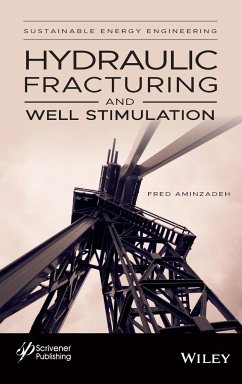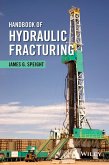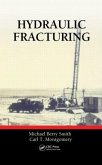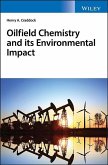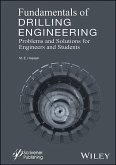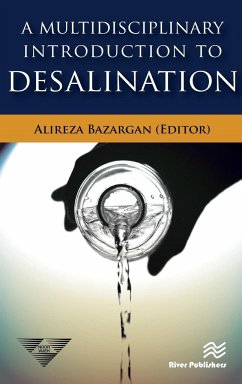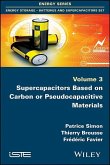Hydraulic Fracturing and Well Stimulation, Volume 1
Herausgeber: Aminzadeh, Fred
Hydraulic Fracturing and Well Stimulation, Volume 1
Herausgeber: Aminzadeh, Fred
- Gebundenes Buch
- Merkliste
- Auf die Merkliste
- Bewerten Bewerten
- Teilen
- Produkt teilen
- Produkterinnerung
- Produkterinnerung
The first volume in the series, Sustainable Energy Engineering, written by some of the foremost authorities in the world on well stimulation, this groundbreaking new volume presents the advantages, drawbacks, and methods of one of the hottest topics in the energy industry: hydraulic fracturing ("fracking"). Hydraulic fracturing (or "fracking") has been a source of both achievement and controversy for years, and it continues to be a hot-button issue all over the world. It has made the United States an energy exporting country once again and kept the price of gasoline low, for consumers and…mehr
Andere Kunden interessierten sich auch für
![Handbook of Hydraulic Fracturing Handbook of Hydraulic Fracturing]() James G SpeightHandbook of Hydraulic Fracturing207,99 €
James G SpeightHandbook of Hydraulic Fracturing207,99 €![Hydraulic Fracturing Hydraulic Fracturing]() Michael Berry SmithHydraulic Fracturing287,99 €
Michael Berry SmithHydraulic Fracturing287,99 €![Oilfield Chemistry and Its Environmental Impact Oilfield Chemistry and Its Environmental Impact]() Henry A CraddockOilfield Chemistry and Its Environmental Impact182,99 €
Henry A CraddockOilfield Chemistry and Its Environmental Impact182,99 €![Fundamentals of Drilling Engineering Fundamentals of Drilling Engineering]() M E HossainFundamentals of Drilling Engineering291,99 €
M E HossainFundamentals of Drilling Engineering291,99 €![Environmental Impacts of Hydraulic Fracturing Environmental Impacts of Hydraulic Fracturing]() Frank R SpellmanEnvironmental Impacts of Hydraulic Fracturing154,99 €
Frank R SpellmanEnvironmental Impacts of Hydraulic Fracturing154,99 €![A Multidisciplinary Introduction to Desalination A Multidisciplinary Introduction to Desalination]() A Multidisciplinary Introduction to Desalination92,99 €
A Multidisciplinary Introduction to Desalination92,99 €![Supercapacitors Based on Carbon or Pseudocapacitive Materials Supercapacitors Based on Carbon or Pseudocapacitive Materials]() Patrice SimonSupercapacitors Based on Carbon or Pseudocapacitive Materials179,99 €
Patrice SimonSupercapacitors Based on Carbon or Pseudocapacitive Materials179,99 €-
-
-
The first volume in the series, Sustainable Energy Engineering, written by some of the foremost authorities in the world on well stimulation, this groundbreaking new volume presents the advantages, drawbacks, and methods of one of the hottest topics in the energy industry: hydraulic fracturing ("fracking"). Hydraulic fracturing (or "fracking") has been a source of both achievement and controversy for years, and it continues to be a hot-button issue all over the world. It has made the United States an energy exporting country once again and kept the price of gasoline low, for consumers and companies. On the other hand, it has been potentially a dangerous and destructive practice that has led to environmental problems and health issues. It is a deeply important subject for the petroleum engineer to explore as much as possible. This collection of papers is the first in the series, Sustainable Energy Engineering, tackling this very complex process of hydraulic fracturing and its environmental and economic ramifications. Born out of the journal by the same name, formerly published by Scrivener Publishing, most of the articles in this volume have been updated, and there are some new additions, as well, to keep the engineer abreast of any updates and new methods in the industry. Truly a snapshot of the state-of-the-art, this groundbreaking volume is a must-have for any petroleum engineer working in the field, environmental engineers, petroleum engineering students, and any other engineer or scientist working with hydraulic fracturing. This breakthrough new volume: * Collects papers on hydraulic fracturing written by world-renowned engineers and scientists and presents them here, in one volume * Weighs both the upsides and downsides of hydraulic fracturing and whether this practice is the right fit for certain projects * Thoroughly covers hydraulic fracturing and other methods of well stimulation for the engineer to be able to solve daily problems on the job, whether in the field or in the office * Deconstructs myths that are prevalent and deeply rooted in the industry and reconstructs logical solutions * Is a valuable resource for the veteran engineer, new hire, or petroleum engineering student
Hinweis: Dieser Artikel kann nur an eine deutsche Lieferadresse ausgeliefert werden.
Hinweis: Dieser Artikel kann nur an eine deutsche Lieferadresse ausgeliefert werden.
Produktdetails
- Produktdetails
- Verlag: Wiley
- Seitenzahl: 330
- Erscheinungstermin: 29. Oktober 2019
- Englisch
- Abmessung: 235mm x 157mm x 22mm
- Gewicht: 629g
- ISBN-13: 9781119555698
- ISBN-10: 1119555698
- Artikelnr.: 54617630
- Herstellerkennzeichnung
- Libri GmbH
- Europaallee 1
- 36244 Bad Hersfeld
- gpsr@libri.de
- Verlag: Wiley
- Seitenzahl: 330
- Erscheinungstermin: 29. Oktober 2019
- Englisch
- Abmessung: 235mm x 157mm x 22mm
- Gewicht: 629g
- ISBN-13: 9781119555698
- ISBN-10: 1119555698
- Artikelnr.: 54617630
- Herstellerkennzeichnung
- Libri GmbH
- Europaallee 1
- 36244 Bad Hersfeld
- gpsr@libri.de
Fred Aminzadeh, PhD, is a world-renowned academic and engineer in the energy industry. A professor at the University of Southern California, he has extensive experience not only in oil and gas, but also in geothermal energy and other areas of energy. He has been a co-author on multiple books and has authored numerous papers that have been well-received by academics and industry experts alike. He is the editor of the journal, The Journal of Sustainable Energy Engineering, formerly of Scrivener Publishing, and he is currently editing the series, Sustainable Energy Engineering, for the Wiley-Scrivener imprint.
Foreword xiii
Part 1: Introduction 1
1 Hydraulic Fracturing, An Overview 3
Fred Aminzadeh
1.1 What is Hydraulic Fracturing? 4
1.2 Why Hydraulic Fracturing is Important 5
1.3 Fracture Characterization 8
1.4 Geomechanics of Hydraulic Fracturing 11
1.5 Environmental Aspects of Hydraulic Fracturing 14
1.6 Induced Seismicity 18
1.7 Case Study: Fracturing Induced Seismicity in California 23
1.8 Assessment of Global Oil and Gas Resources Amenable for Extraction via
Hydraulic Fracturing 27
1.9 Economics of HF 27
1.10 Conclusions 28
Acknowledgement 30
References 30
Part 2: General Concepts 35
2 Evolution of Stress Transfer Mechanisms During Mechanical Interaction
Between Hydraulic Fractures and Natural Fractures 37
Birendra Jha
2.1 Introduction 37
2.2 Physical Model 39
2.3 Mathematical Formulation 40
2.4 Numerical Model 43
2.5 Simulation Results 44
2.6 Effect of Hydraulic Fracturing on Natural Fractures 46
2.7 Conclusion 49
References 50
3 Primer on Hydraulic Fracturing Concerning Initiatives on Energy
Sustainability 53
Michael Holloway and Oliver Rudd
3.1 Hydraulic Fracturing 54
3.1.1 Environmental Impact - Reality vs. Myth 54
3.1.2 The Tower of Babel and How it Could be the Cause of Much of the
Fracking Debate 55
3.1.3 Frac Fluids and Composition 57
3.1.4 Uses and Needs for Frac Fluids 57
3.1.5 Common Fracturing Additives 58
3.1.6 Typical Percentages of Commonly Used Additives 60
3.1.6.1 Proppants 61
3.1.6.2 Silica Sand 63
3.1.6.3 Resin Coated Proppant 65
3.1.6.4 Manufactured Ceramics Proppants 65
3.2 Additional Types 66
3.3 Other Most Common Objections to Drilling Operations 66
3.3.1 Noise 67
3.4 Changes in Landscape and Beauty of Surroundings 68
3.5 Increased Traffic 69
3.6 Chemicals and Products on Locations 70
3.6.1 Material Safety Data Sheets (MSDS) 72
3.6.1.1 Contents of an MSDS 73
3.6.1.2 Product Identification 73
3.6.1.3 Hazardous Ingredients of Mixtures 74
3.6.1.4 Physical Data 74
3.6.1.5 Fire & Explosion Hazard Data 75
3.6.1.6 Health Hazard Data 76
3.6.1.7 Reactivity Data 76
3.6.1.8 Personal Protection Information 77
3.7 Conclusion 77
Bibliography 78
4 A Graph Theoretic Approach for Spatial Analysis of Induced Fracture
Networks 79
Deborah Glosser and Jennifer R. Bauer
4.1 Background and Rationale 80
4.2 Graph-Based Spatial Analysis 83
4.2.1 Acquire Geologic Data and Define Regional Bounding Lithology 84
4.2.2 Details of the Topological Algorithm 85
4.2.2.1 Data Acquisition, Conditioning and Quanta 85
4.2.2.2 Details of the k-Nearest Neighbor Algorithm 86
4.2.3 The Value of the Topological Approach Algorithm 86
4.3 Real World Applications of the Algorithm 87
4.3.1 Bradford Field: Contrasting the Graph-Based Approaches; k Sensitivity
87
4.3.1.1 Data Sources 88
4.3.1.2 Results 88
4.3.2 Armstrong PA: Testing the Algorithms Against a Known Leakage Scenario
88
4.3.2.1 Data Sources 90
4.3.2.2 Results 90
4.4 Discussion 91
4.4.1 Uses for Industry and Regulators 93
4.5 Conclusions 93
Acknowledgements 94
References 94
Part 3: Optimum Design Parameters 99
5 Fracture Spacing Design for Multistage Hydraulic Fracturing Completions
for Improved Productivity 101
D. Maity, J. Ciezobka and I. Salehi
5.1 Introduction 101
5.2 Method 103
5.2.1 Impact of Natural Fractures 104
5.2.2 Workflow 107
5.2.3 Model Fine-Tuning 108
5.2.4 Need for Artificial Intelligence 109
5.3 Data 110
5.4 Results 114
5.4.1 Applicability Considerations 120
5.5 Concluding Remarks 121
Acknowledgement 122
References 122
6 Clustering-Based Optimal Perforation Design Using Well Logs 125
Andrei S. Popa, Steve Cassidy and Sinisha Jikich
6.1 Introduction 126
6.2 Objective and Motivation 127
6.3 Technology 128
6.4 Clustering Analysis 129
6.4.1 C-Means (FCM) Algorithm 130
6.5 Methodology and Analysis 131
6.5.1 Available Data 131
6.6 Applying the FCM Algorithm 134
6.7 Results and Discussion 136
6.8 Conclusions 139
Acknowledgements 139
References 139
7 Horizontal Well Spacing and Hydraulic Fracturing Design Optimization: A
Case Study on Utica-Point Pleasant Shale Play 141
Alireza Shahkarami and Guochang Wang
7.1 Introduction 142
7.2 Methodology 143
7.2.1 The Base Reservoir Simulation Model 143
7.3 Optimization Scenarios 147
7.4 Results and Discussion 148
7.4.1 Base Reservoir Model - A Single Well Case 148
7.4.2 Multi-Lateral Depletion - Finding the Optimum Number of Wells 148
7.4.3 Completion Parameters 151
7.4.4 Second Economic Scenario, Reducing the Cost of Completion 153
7.5 Conclusion 154
Acknowledgments 156
Part 4: Fracture Reservoir Characterization 159
Ahmed Ouenes
Introduction 159
References 161
8 Geomechanical Modeling of Fault Systems Using the Material Point Method -
Application to the Estimation of Induced Seismicity Potential to Bolster
Hydraulic Fracturing Social License 163
Nicholas M. Umholtz and Ahmed Ouenes
8.1 Introduction 164
8.2 The Social License to Operate (SLO) 165
8.3 Regional Faults in Oklahoma, USA and Alberta, Canada used as Input in
Geomechanical Modeling 166
8.4 Modeling Earthquake Potential using Numerical Material Models 168
8.5 A New Workflow for Estimating Induced Seismicity Potential and its
Application to Oklahoma and Alberta 173
8.6 The Benefits of a Large Scale Predictive Model and Future Research 178
8.7 Conflict of Interest 179
Acknowledgements 179
References 179
9 Correlating Pressure with Microseismic to Understand Fluid-Reservoir
Interactions During Hydraulic Fracturing 181
Debotyam Maity
9.1 Introduction 181
9.2 Method 182
9.2.1 Pressure Data Analysis 182
9.2.2 Microseismic Data Analysis 186
9.3 Data 187
9.4 Results 188
9.4.1 Pitfalls in Analysis 196
9.5 Conclusions 196
9.6 Acknowledgements 197
References 197
10 Multigrid Fracture Stimulated Reservoir Volume Mapping Coupled with a
Novel Mathematical Optimization Approach to Shale Reservoir Well and
Fracture Design 199
Ahmed Alzahabi, Noah Berlow, M.Y. Soliman and Ghazi AlQahtani
10.1 Introduction 200
10.2 Problem Definition and Modeling 203
10.2.1 Geometric Interpretation 203
10.2.1.1 Fracture Geometry 203
10.2.2 The Developed Model Flow Chart 204
10.2.3 Well and Fracture Design Vector Components 204
10.3 Development of a New Mathematical Model 204
10.3.1 Methodology 207
10.3.2 Objective Function 207
10.3.3 Assumptions and Constraints Considered in the Mathematical Model 207
10.3.3.1 Sets 208
10.3.3.2 Variables 208
10.3.3.3 Decision Variables 208
10.3.3.4 Extended Sets 208
10.3.3.5 Constant Parameters 209
10.3.3.6 Constraints 209
10.3.4 Stimulated Reservoir Volume Representation 210
10.3.5 Optimization Procedure 211
10.4 Model Building 212
10.4.1 Simulation Model of Well Pad and SRV's Evaluation 214
10.5 Results and Discussions 216
10.6 Conclusions and Recommendations 216
References 218
Appendix A: Abbreviations 220
Appendix B: Definition of the Fracturability Index Used in the Well
Placement Process 220
Appendix C: Geometric Interpretation of Parameters Used in Building the
Model 221
11 A Semi-Analytical Model for Predicting Productivity of Refractured Oil
Wells with Uniformly Distributed Radial Fractures 227
Xiao Cai, Boyun Guo and Gao li
11.1 Introduction 228
11.2 Mathematical Model 229
11.3 Model Verification 231
11.4 Sensitivity Analysis 231
11.5 Conclusions 233
Acknowledgements 234
References 234
Appendix A: Derivation of Inflow Equation for Wells with Radial Fractures
under Pseudo-Steady State Flow Conditions 235
Part 5: Environmental Issues of Hydraulic Fracturing 243
Introduction 243
References 245
12 The Role of Human Factors Considerations and Safety Culture in the
Safety of Hydraulic Fracturing (Fracking) 247
Jamie Heinecke, Nima Jabbari and Najmedin Meshkati
12.1 Introduction 248
12.2 Benefits of Hydraulic Fracturing 250
12.3 Common Criticisms 250
12.4 Different Steps of Hydraulic Fracturing and Proposed Human Factors
Considerations 252
12.5 Hydraulic Fracturing Process: Drilling 254
12.6 Hydraulic Fracturing Process: Fluid Injection 257
12.7 Fracking Fluid 258
12.8 Wastewater 258
12.9 Human Factors and Safety Culture Considerations 259
12.9.1 Human Factors 259
12.9.1.1 Microergonomics 260
12.9.1.2 Macroergonomics 260
12.9.2 Safety Culture 261
12.10 Examples of Recent Incidents 263
12.11 Conclusion and Recommendations 265
Acknowledgment 266
References 266
13 Flowback of Fracturing Fluids with Upgraded Visualization of Hydraulic
Fractures and Its Implications on Overall Well Performance 271
Khush Desai and Fred Aminzadeh
13.1 Introduction 272
13.2 Assumptions 272
13.3 Upgraded Visualization of Hydraulic Fracturing 273
13.3.1 Concept 273
13.3.2 Results 274
13.4 Reasons for Partial Flowback 275
13.4.1 Fracture Modelling 275
13.4.2 Depth of Penetration 276
13.4.3 Closing of Fractures 277
13.4.4 Chemical Interaction of Fracturing Fluids 277
13.5 Impact of Parameters under Control 278
13.6 Loss in Incremental Oil Production 279
13.7 Conclusions 280
13.8 Limitations 281
References 281
Appendix A 282
14 Assessing the Groundwater Contamination Potential from a Well in a
Hydraulic Fracturing Operation 285
Nima Jabbari, Fred Aminzadeh and Felipe P. J. de Barros
14.1 Introduction 286
14.2 Risk Pathways to the Shallow Groundwater 288
14.3 Problem Statement 289
14.4 Mathematical Formulation 290
14.5 Hypothetical Case Description and the Numerical Method 291
14.6 Results and Discussion 294
14.7 Conclusion 297
References 298
Index 303
Part 1: Introduction 1
1 Hydraulic Fracturing, An Overview 3
Fred Aminzadeh
1.1 What is Hydraulic Fracturing? 4
1.2 Why Hydraulic Fracturing is Important 5
1.3 Fracture Characterization 8
1.4 Geomechanics of Hydraulic Fracturing 11
1.5 Environmental Aspects of Hydraulic Fracturing 14
1.6 Induced Seismicity 18
1.7 Case Study: Fracturing Induced Seismicity in California 23
1.8 Assessment of Global Oil and Gas Resources Amenable for Extraction via
Hydraulic Fracturing 27
1.9 Economics of HF 27
1.10 Conclusions 28
Acknowledgement 30
References 30
Part 2: General Concepts 35
2 Evolution of Stress Transfer Mechanisms During Mechanical Interaction
Between Hydraulic Fractures and Natural Fractures 37
Birendra Jha
2.1 Introduction 37
2.2 Physical Model 39
2.3 Mathematical Formulation 40
2.4 Numerical Model 43
2.5 Simulation Results 44
2.6 Effect of Hydraulic Fracturing on Natural Fractures 46
2.7 Conclusion 49
References 50
3 Primer on Hydraulic Fracturing Concerning Initiatives on Energy
Sustainability 53
Michael Holloway and Oliver Rudd
3.1 Hydraulic Fracturing 54
3.1.1 Environmental Impact - Reality vs. Myth 54
3.1.2 The Tower of Babel and How it Could be the Cause of Much of the
Fracking Debate 55
3.1.3 Frac Fluids and Composition 57
3.1.4 Uses and Needs for Frac Fluids 57
3.1.5 Common Fracturing Additives 58
3.1.6 Typical Percentages of Commonly Used Additives 60
3.1.6.1 Proppants 61
3.1.6.2 Silica Sand 63
3.1.6.3 Resin Coated Proppant 65
3.1.6.4 Manufactured Ceramics Proppants 65
3.2 Additional Types 66
3.3 Other Most Common Objections to Drilling Operations 66
3.3.1 Noise 67
3.4 Changes in Landscape and Beauty of Surroundings 68
3.5 Increased Traffic 69
3.6 Chemicals and Products on Locations 70
3.6.1 Material Safety Data Sheets (MSDS) 72
3.6.1.1 Contents of an MSDS 73
3.6.1.2 Product Identification 73
3.6.1.3 Hazardous Ingredients of Mixtures 74
3.6.1.4 Physical Data 74
3.6.1.5 Fire & Explosion Hazard Data 75
3.6.1.6 Health Hazard Data 76
3.6.1.7 Reactivity Data 76
3.6.1.8 Personal Protection Information 77
3.7 Conclusion 77
Bibliography 78
4 A Graph Theoretic Approach for Spatial Analysis of Induced Fracture
Networks 79
Deborah Glosser and Jennifer R. Bauer
4.1 Background and Rationale 80
4.2 Graph-Based Spatial Analysis 83
4.2.1 Acquire Geologic Data and Define Regional Bounding Lithology 84
4.2.2 Details of the Topological Algorithm 85
4.2.2.1 Data Acquisition, Conditioning and Quanta 85
4.2.2.2 Details of the k-Nearest Neighbor Algorithm 86
4.2.3 The Value of the Topological Approach Algorithm 86
4.3 Real World Applications of the Algorithm 87
4.3.1 Bradford Field: Contrasting the Graph-Based Approaches; k Sensitivity
87
4.3.1.1 Data Sources 88
4.3.1.2 Results 88
4.3.2 Armstrong PA: Testing the Algorithms Against a Known Leakage Scenario
88
4.3.2.1 Data Sources 90
4.3.2.2 Results 90
4.4 Discussion 91
4.4.1 Uses for Industry and Regulators 93
4.5 Conclusions 93
Acknowledgements 94
References 94
Part 3: Optimum Design Parameters 99
5 Fracture Spacing Design for Multistage Hydraulic Fracturing Completions
for Improved Productivity 101
D. Maity, J. Ciezobka and I. Salehi
5.1 Introduction 101
5.2 Method 103
5.2.1 Impact of Natural Fractures 104
5.2.2 Workflow 107
5.2.3 Model Fine-Tuning 108
5.2.4 Need for Artificial Intelligence 109
5.3 Data 110
5.4 Results 114
5.4.1 Applicability Considerations 120
5.5 Concluding Remarks 121
Acknowledgement 122
References 122
6 Clustering-Based Optimal Perforation Design Using Well Logs 125
Andrei S. Popa, Steve Cassidy and Sinisha Jikich
6.1 Introduction 126
6.2 Objective and Motivation 127
6.3 Technology 128
6.4 Clustering Analysis 129
6.4.1 C-Means (FCM) Algorithm 130
6.5 Methodology and Analysis 131
6.5.1 Available Data 131
6.6 Applying the FCM Algorithm 134
6.7 Results and Discussion 136
6.8 Conclusions 139
Acknowledgements 139
References 139
7 Horizontal Well Spacing and Hydraulic Fracturing Design Optimization: A
Case Study on Utica-Point Pleasant Shale Play 141
Alireza Shahkarami and Guochang Wang
7.1 Introduction 142
7.2 Methodology 143
7.2.1 The Base Reservoir Simulation Model 143
7.3 Optimization Scenarios 147
7.4 Results and Discussion 148
7.4.1 Base Reservoir Model - A Single Well Case 148
7.4.2 Multi-Lateral Depletion - Finding the Optimum Number of Wells 148
7.4.3 Completion Parameters 151
7.4.4 Second Economic Scenario, Reducing the Cost of Completion 153
7.5 Conclusion 154
Acknowledgments 156
Part 4: Fracture Reservoir Characterization 159
Ahmed Ouenes
Introduction 159
References 161
8 Geomechanical Modeling of Fault Systems Using the Material Point Method -
Application to the Estimation of Induced Seismicity Potential to Bolster
Hydraulic Fracturing Social License 163
Nicholas M. Umholtz and Ahmed Ouenes
8.1 Introduction 164
8.2 The Social License to Operate (SLO) 165
8.3 Regional Faults in Oklahoma, USA and Alberta, Canada used as Input in
Geomechanical Modeling 166
8.4 Modeling Earthquake Potential using Numerical Material Models 168
8.5 A New Workflow for Estimating Induced Seismicity Potential and its
Application to Oklahoma and Alberta 173
8.6 The Benefits of a Large Scale Predictive Model and Future Research 178
8.7 Conflict of Interest 179
Acknowledgements 179
References 179
9 Correlating Pressure with Microseismic to Understand Fluid-Reservoir
Interactions During Hydraulic Fracturing 181
Debotyam Maity
9.1 Introduction 181
9.2 Method 182
9.2.1 Pressure Data Analysis 182
9.2.2 Microseismic Data Analysis 186
9.3 Data 187
9.4 Results 188
9.4.1 Pitfalls in Analysis 196
9.5 Conclusions 196
9.6 Acknowledgements 197
References 197
10 Multigrid Fracture Stimulated Reservoir Volume Mapping Coupled with a
Novel Mathematical Optimization Approach to Shale Reservoir Well and
Fracture Design 199
Ahmed Alzahabi, Noah Berlow, M.Y. Soliman and Ghazi AlQahtani
10.1 Introduction 200
10.2 Problem Definition and Modeling 203
10.2.1 Geometric Interpretation 203
10.2.1.1 Fracture Geometry 203
10.2.2 The Developed Model Flow Chart 204
10.2.3 Well and Fracture Design Vector Components 204
10.3 Development of a New Mathematical Model 204
10.3.1 Methodology 207
10.3.2 Objective Function 207
10.3.3 Assumptions and Constraints Considered in the Mathematical Model 207
10.3.3.1 Sets 208
10.3.3.2 Variables 208
10.3.3.3 Decision Variables 208
10.3.3.4 Extended Sets 208
10.3.3.5 Constant Parameters 209
10.3.3.6 Constraints 209
10.3.4 Stimulated Reservoir Volume Representation 210
10.3.5 Optimization Procedure 211
10.4 Model Building 212
10.4.1 Simulation Model of Well Pad and SRV's Evaluation 214
10.5 Results and Discussions 216
10.6 Conclusions and Recommendations 216
References 218
Appendix A: Abbreviations 220
Appendix B: Definition of the Fracturability Index Used in the Well
Placement Process 220
Appendix C: Geometric Interpretation of Parameters Used in Building the
Model 221
11 A Semi-Analytical Model for Predicting Productivity of Refractured Oil
Wells with Uniformly Distributed Radial Fractures 227
Xiao Cai, Boyun Guo and Gao li
11.1 Introduction 228
11.2 Mathematical Model 229
11.3 Model Verification 231
11.4 Sensitivity Analysis 231
11.5 Conclusions 233
Acknowledgements 234
References 234
Appendix A: Derivation of Inflow Equation for Wells with Radial Fractures
under Pseudo-Steady State Flow Conditions 235
Part 5: Environmental Issues of Hydraulic Fracturing 243
Introduction 243
References 245
12 The Role of Human Factors Considerations and Safety Culture in the
Safety of Hydraulic Fracturing (Fracking) 247
Jamie Heinecke, Nima Jabbari and Najmedin Meshkati
12.1 Introduction 248
12.2 Benefits of Hydraulic Fracturing 250
12.3 Common Criticisms 250
12.4 Different Steps of Hydraulic Fracturing and Proposed Human Factors
Considerations 252
12.5 Hydraulic Fracturing Process: Drilling 254
12.6 Hydraulic Fracturing Process: Fluid Injection 257
12.7 Fracking Fluid 258
12.8 Wastewater 258
12.9 Human Factors and Safety Culture Considerations 259
12.9.1 Human Factors 259
12.9.1.1 Microergonomics 260
12.9.1.2 Macroergonomics 260
12.9.2 Safety Culture 261
12.10 Examples of Recent Incidents 263
12.11 Conclusion and Recommendations 265
Acknowledgment 266
References 266
13 Flowback of Fracturing Fluids with Upgraded Visualization of Hydraulic
Fractures and Its Implications on Overall Well Performance 271
Khush Desai and Fred Aminzadeh
13.1 Introduction 272
13.2 Assumptions 272
13.3 Upgraded Visualization of Hydraulic Fracturing 273
13.3.1 Concept 273
13.3.2 Results 274
13.4 Reasons for Partial Flowback 275
13.4.1 Fracture Modelling 275
13.4.2 Depth of Penetration 276
13.4.3 Closing of Fractures 277
13.4.4 Chemical Interaction of Fracturing Fluids 277
13.5 Impact of Parameters under Control 278
13.6 Loss in Incremental Oil Production 279
13.7 Conclusions 280
13.8 Limitations 281
References 281
Appendix A 282
14 Assessing the Groundwater Contamination Potential from a Well in a
Hydraulic Fracturing Operation 285
Nima Jabbari, Fred Aminzadeh and Felipe P. J. de Barros
14.1 Introduction 286
14.2 Risk Pathways to the Shallow Groundwater 288
14.3 Problem Statement 289
14.4 Mathematical Formulation 290
14.5 Hypothetical Case Description and the Numerical Method 291
14.6 Results and Discussion 294
14.7 Conclusion 297
References 298
Index 303
Foreword xiii
Part 1: Introduction 1
1 Hydraulic Fracturing, An Overview 3
Fred Aminzadeh
1.1 What is Hydraulic Fracturing? 4
1.2 Why Hydraulic Fracturing is Important 5
1.3 Fracture Characterization 8
1.4 Geomechanics of Hydraulic Fracturing 11
1.5 Environmental Aspects of Hydraulic Fracturing 14
1.6 Induced Seismicity 18
1.7 Case Study: Fracturing Induced Seismicity in California 23
1.8 Assessment of Global Oil and Gas Resources Amenable for Extraction via
Hydraulic Fracturing 27
1.9 Economics of HF 27
1.10 Conclusions 28
Acknowledgement 30
References 30
Part 2: General Concepts 35
2 Evolution of Stress Transfer Mechanisms During Mechanical Interaction
Between Hydraulic Fractures and Natural Fractures 37
Birendra Jha
2.1 Introduction 37
2.2 Physical Model 39
2.3 Mathematical Formulation 40
2.4 Numerical Model 43
2.5 Simulation Results 44
2.6 Effect of Hydraulic Fracturing on Natural Fractures 46
2.7 Conclusion 49
References 50
3 Primer on Hydraulic Fracturing Concerning Initiatives on Energy
Sustainability 53
Michael Holloway and Oliver Rudd
3.1 Hydraulic Fracturing 54
3.1.1 Environmental Impact - Reality vs. Myth 54
3.1.2 The Tower of Babel and How it Could be the Cause of Much of the
Fracking Debate 55
3.1.3 Frac Fluids and Composition 57
3.1.4 Uses and Needs for Frac Fluids 57
3.1.5 Common Fracturing Additives 58
3.1.6 Typical Percentages of Commonly Used Additives 60
3.1.6.1 Proppants 61
3.1.6.2 Silica Sand 63
3.1.6.3 Resin Coated Proppant 65
3.1.6.4 Manufactured Ceramics Proppants 65
3.2 Additional Types 66
3.3 Other Most Common Objections to Drilling Operations 66
3.3.1 Noise 67
3.4 Changes in Landscape and Beauty of Surroundings 68
3.5 Increased Traffic 69
3.6 Chemicals and Products on Locations 70
3.6.1 Material Safety Data Sheets (MSDS) 72
3.6.1.1 Contents of an MSDS 73
3.6.1.2 Product Identification 73
3.6.1.3 Hazardous Ingredients of Mixtures 74
3.6.1.4 Physical Data 74
3.6.1.5 Fire & Explosion Hazard Data 75
3.6.1.6 Health Hazard Data 76
3.6.1.7 Reactivity Data 76
3.6.1.8 Personal Protection Information 77
3.7 Conclusion 77
Bibliography 78
4 A Graph Theoretic Approach for Spatial Analysis of Induced Fracture
Networks 79
Deborah Glosser and Jennifer R. Bauer
4.1 Background and Rationale 80
4.2 Graph-Based Spatial Analysis 83
4.2.1 Acquire Geologic Data and Define Regional Bounding Lithology 84
4.2.2 Details of the Topological Algorithm 85
4.2.2.1 Data Acquisition, Conditioning and Quanta 85
4.2.2.2 Details of the k-Nearest Neighbor Algorithm 86
4.2.3 The Value of the Topological Approach Algorithm 86
4.3 Real World Applications of the Algorithm 87
4.3.1 Bradford Field: Contrasting the Graph-Based Approaches; k Sensitivity
87
4.3.1.1 Data Sources 88
4.3.1.2 Results 88
4.3.2 Armstrong PA: Testing the Algorithms Against a Known Leakage Scenario
88
4.3.2.1 Data Sources 90
4.3.2.2 Results 90
4.4 Discussion 91
4.4.1 Uses for Industry and Regulators 93
4.5 Conclusions 93
Acknowledgements 94
References 94
Part 3: Optimum Design Parameters 99
5 Fracture Spacing Design for Multistage Hydraulic Fracturing Completions
for Improved Productivity 101
D. Maity, J. Ciezobka and I. Salehi
5.1 Introduction 101
5.2 Method 103
5.2.1 Impact of Natural Fractures 104
5.2.2 Workflow 107
5.2.3 Model Fine-Tuning 108
5.2.4 Need for Artificial Intelligence 109
5.3 Data 110
5.4 Results 114
5.4.1 Applicability Considerations 120
5.5 Concluding Remarks 121
Acknowledgement 122
References 122
6 Clustering-Based Optimal Perforation Design Using Well Logs 125
Andrei S. Popa, Steve Cassidy and Sinisha Jikich
6.1 Introduction 126
6.2 Objective and Motivation 127
6.3 Technology 128
6.4 Clustering Analysis 129
6.4.1 C-Means (FCM) Algorithm 130
6.5 Methodology and Analysis 131
6.5.1 Available Data 131
6.6 Applying the FCM Algorithm 134
6.7 Results and Discussion 136
6.8 Conclusions 139
Acknowledgements 139
References 139
7 Horizontal Well Spacing and Hydraulic Fracturing Design Optimization: A
Case Study on Utica-Point Pleasant Shale Play 141
Alireza Shahkarami and Guochang Wang
7.1 Introduction 142
7.2 Methodology 143
7.2.1 The Base Reservoir Simulation Model 143
7.3 Optimization Scenarios 147
7.4 Results and Discussion 148
7.4.1 Base Reservoir Model - A Single Well Case 148
7.4.2 Multi-Lateral Depletion - Finding the Optimum Number of Wells 148
7.4.3 Completion Parameters 151
7.4.4 Second Economic Scenario, Reducing the Cost of Completion 153
7.5 Conclusion 154
Acknowledgments 156
Part 4: Fracture Reservoir Characterization 159
Ahmed Ouenes
Introduction 159
References 161
8 Geomechanical Modeling of Fault Systems Using the Material Point Method -
Application to the Estimation of Induced Seismicity Potential to Bolster
Hydraulic Fracturing Social License 163
Nicholas M. Umholtz and Ahmed Ouenes
8.1 Introduction 164
8.2 The Social License to Operate (SLO) 165
8.3 Regional Faults in Oklahoma, USA and Alberta, Canada used as Input in
Geomechanical Modeling 166
8.4 Modeling Earthquake Potential using Numerical Material Models 168
8.5 A New Workflow for Estimating Induced Seismicity Potential and its
Application to Oklahoma and Alberta 173
8.6 The Benefits of a Large Scale Predictive Model and Future Research 178
8.7 Conflict of Interest 179
Acknowledgements 179
References 179
9 Correlating Pressure with Microseismic to Understand Fluid-Reservoir
Interactions During Hydraulic Fracturing 181
Debotyam Maity
9.1 Introduction 181
9.2 Method 182
9.2.1 Pressure Data Analysis 182
9.2.2 Microseismic Data Analysis 186
9.3 Data 187
9.4 Results 188
9.4.1 Pitfalls in Analysis 196
9.5 Conclusions 196
9.6 Acknowledgements 197
References 197
10 Multigrid Fracture Stimulated Reservoir Volume Mapping Coupled with a
Novel Mathematical Optimization Approach to Shale Reservoir Well and
Fracture Design 199
Ahmed Alzahabi, Noah Berlow, M.Y. Soliman and Ghazi AlQahtani
10.1 Introduction 200
10.2 Problem Definition and Modeling 203
10.2.1 Geometric Interpretation 203
10.2.1.1 Fracture Geometry 203
10.2.2 The Developed Model Flow Chart 204
10.2.3 Well and Fracture Design Vector Components 204
10.3 Development of a New Mathematical Model 204
10.3.1 Methodology 207
10.3.2 Objective Function 207
10.3.3 Assumptions and Constraints Considered in the Mathematical Model 207
10.3.3.1 Sets 208
10.3.3.2 Variables 208
10.3.3.3 Decision Variables 208
10.3.3.4 Extended Sets 208
10.3.3.5 Constant Parameters 209
10.3.3.6 Constraints 209
10.3.4 Stimulated Reservoir Volume Representation 210
10.3.5 Optimization Procedure 211
10.4 Model Building 212
10.4.1 Simulation Model of Well Pad and SRV's Evaluation 214
10.5 Results and Discussions 216
10.6 Conclusions and Recommendations 216
References 218
Appendix A: Abbreviations 220
Appendix B: Definition of the Fracturability Index Used in the Well
Placement Process 220
Appendix C: Geometric Interpretation of Parameters Used in Building the
Model 221
11 A Semi-Analytical Model for Predicting Productivity of Refractured Oil
Wells with Uniformly Distributed Radial Fractures 227
Xiao Cai, Boyun Guo and Gao li
11.1 Introduction 228
11.2 Mathematical Model 229
11.3 Model Verification 231
11.4 Sensitivity Analysis 231
11.5 Conclusions 233
Acknowledgements 234
References 234
Appendix A: Derivation of Inflow Equation for Wells with Radial Fractures
under Pseudo-Steady State Flow Conditions 235
Part 5: Environmental Issues of Hydraulic Fracturing 243
Introduction 243
References 245
12 The Role of Human Factors Considerations and Safety Culture in the
Safety of Hydraulic Fracturing (Fracking) 247
Jamie Heinecke, Nima Jabbari and Najmedin Meshkati
12.1 Introduction 248
12.2 Benefits of Hydraulic Fracturing 250
12.3 Common Criticisms 250
12.4 Different Steps of Hydraulic Fracturing and Proposed Human Factors
Considerations 252
12.5 Hydraulic Fracturing Process: Drilling 254
12.6 Hydraulic Fracturing Process: Fluid Injection 257
12.7 Fracking Fluid 258
12.8 Wastewater 258
12.9 Human Factors and Safety Culture Considerations 259
12.9.1 Human Factors 259
12.9.1.1 Microergonomics 260
12.9.1.2 Macroergonomics 260
12.9.2 Safety Culture 261
12.10 Examples of Recent Incidents 263
12.11 Conclusion and Recommendations 265
Acknowledgment 266
References 266
13 Flowback of Fracturing Fluids with Upgraded Visualization of Hydraulic
Fractures and Its Implications on Overall Well Performance 271
Khush Desai and Fred Aminzadeh
13.1 Introduction 272
13.2 Assumptions 272
13.3 Upgraded Visualization of Hydraulic Fracturing 273
13.3.1 Concept 273
13.3.2 Results 274
13.4 Reasons for Partial Flowback 275
13.4.1 Fracture Modelling 275
13.4.2 Depth of Penetration 276
13.4.3 Closing of Fractures 277
13.4.4 Chemical Interaction of Fracturing Fluids 277
13.5 Impact of Parameters under Control 278
13.6 Loss in Incremental Oil Production 279
13.7 Conclusions 280
13.8 Limitations 281
References 281
Appendix A 282
14 Assessing the Groundwater Contamination Potential from a Well in a
Hydraulic Fracturing Operation 285
Nima Jabbari, Fred Aminzadeh and Felipe P. J. de Barros
14.1 Introduction 286
14.2 Risk Pathways to the Shallow Groundwater 288
14.3 Problem Statement 289
14.4 Mathematical Formulation 290
14.5 Hypothetical Case Description and the Numerical Method 291
14.6 Results and Discussion 294
14.7 Conclusion 297
References 298
Index 303
Part 1: Introduction 1
1 Hydraulic Fracturing, An Overview 3
Fred Aminzadeh
1.1 What is Hydraulic Fracturing? 4
1.2 Why Hydraulic Fracturing is Important 5
1.3 Fracture Characterization 8
1.4 Geomechanics of Hydraulic Fracturing 11
1.5 Environmental Aspects of Hydraulic Fracturing 14
1.6 Induced Seismicity 18
1.7 Case Study: Fracturing Induced Seismicity in California 23
1.8 Assessment of Global Oil and Gas Resources Amenable for Extraction via
Hydraulic Fracturing 27
1.9 Economics of HF 27
1.10 Conclusions 28
Acknowledgement 30
References 30
Part 2: General Concepts 35
2 Evolution of Stress Transfer Mechanisms During Mechanical Interaction
Between Hydraulic Fractures and Natural Fractures 37
Birendra Jha
2.1 Introduction 37
2.2 Physical Model 39
2.3 Mathematical Formulation 40
2.4 Numerical Model 43
2.5 Simulation Results 44
2.6 Effect of Hydraulic Fracturing on Natural Fractures 46
2.7 Conclusion 49
References 50
3 Primer on Hydraulic Fracturing Concerning Initiatives on Energy
Sustainability 53
Michael Holloway and Oliver Rudd
3.1 Hydraulic Fracturing 54
3.1.1 Environmental Impact - Reality vs. Myth 54
3.1.2 The Tower of Babel and How it Could be the Cause of Much of the
Fracking Debate 55
3.1.3 Frac Fluids and Composition 57
3.1.4 Uses and Needs for Frac Fluids 57
3.1.5 Common Fracturing Additives 58
3.1.6 Typical Percentages of Commonly Used Additives 60
3.1.6.1 Proppants 61
3.1.6.2 Silica Sand 63
3.1.6.3 Resin Coated Proppant 65
3.1.6.4 Manufactured Ceramics Proppants 65
3.2 Additional Types 66
3.3 Other Most Common Objections to Drilling Operations 66
3.3.1 Noise 67
3.4 Changes in Landscape and Beauty of Surroundings 68
3.5 Increased Traffic 69
3.6 Chemicals and Products on Locations 70
3.6.1 Material Safety Data Sheets (MSDS) 72
3.6.1.1 Contents of an MSDS 73
3.6.1.2 Product Identification 73
3.6.1.3 Hazardous Ingredients of Mixtures 74
3.6.1.4 Physical Data 74
3.6.1.5 Fire & Explosion Hazard Data 75
3.6.1.6 Health Hazard Data 76
3.6.1.7 Reactivity Data 76
3.6.1.8 Personal Protection Information 77
3.7 Conclusion 77
Bibliography 78
4 A Graph Theoretic Approach for Spatial Analysis of Induced Fracture
Networks 79
Deborah Glosser and Jennifer R. Bauer
4.1 Background and Rationale 80
4.2 Graph-Based Spatial Analysis 83
4.2.1 Acquire Geologic Data and Define Regional Bounding Lithology 84
4.2.2 Details of the Topological Algorithm 85
4.2.2.1 Data Acquisition, Conditioning and Quanta 85
4.2.2.2 Details of the k-Nearest Neighbor Algorithm 86
4.2.3 The Value of the Topological Approach Algorithm 86
4.3 Real World Applications of the Algorithm 87
4.3.1 Bradford Field: Contrasting the Graph-Based Approaches; k Sensitivity
87
4.3.1.1 Data Sources 88
4.3.1.2 Results 88
4.3.2 Armstrong PA: Testing the Algorithms Against a Known Leakage Scenario
88
4.3.2.1 Data Sources 90
4.3.2.2 Results 90
4.4 Discussion 91
4.4.1 Uses for Industry and Regulators 93
4.5 Conclusions 93
Acknowledgements 94
References 94
Part 3: Optimum Design Parameters 99
5 Fracture Spacing Design for Multistage Hydraulic Fracturing Completions
for Improved Productivity 101
D. Maity, J. Ciezobka and I. Salehi
5.1 Introduction 101
5.2 Method 103
5.2.1 Impact of Natural Fractures 104
5.2.2 Workflow 107
5.2.3 Model Fine-Tuning 108
5.2.4 Need for Artificial Intelligence 109
5.3 Data 110
5.4 Results 114
5.4.1 Applicability Considerations 120
5.5 Concluding Remarks 121
Acknowledgement 122
References 122
6 Clustering-Based Optimal Perforation Design Using Well Logs 125
Andrei S. Popa, Steve Cassidy and Sinisha Jikich
6.1 Introduction 126
6.2 Objective and Motivation 127
6.3 Technology 128
6.4 Clustering Analysis 129
6.4.1 C-Means (FCM) Algorithm 130
6.5 Methodology and Analysis 131
6.5.1 Available Data 131
6.6 Applying the FCM Algorithm 134
6.7 Results and Discussion 136
6.8 Conclusions 139
Acknowledgements 139
References 139
7 Horizontal Well Spacing and Hydraulic Fracturing Design Optimization: A
Case Study on Utica-Point Pleasant Shale Play 141
Alireza Shahkarami and Guochang Wang
7.1 Introduction 142
7.2 Methodology 143
7.2.1 The Base Reservoir Simulation Model 143
7.3 Optimization Scenarios 147
7.4 Results and Discussion 148
7.4.1 Base Reservoir Model - A Single Well Case 148
7.4.2 Multi-Lateral Depletion - Finding the Optimum Number of Wells 148
7.4.3 Completion Parameters 151
7.4.4 Second Economic Scenario, Reducing the Cost of Completion 153
7.5 Conclusion 154
Acknowledgments 156
Part 4: Fracture Reservoir Characterization 159
Ahmed Ouenes
Introduction 159
References 161
8 Geomechanical Modeling of Fault Systems Using the Material Point Method -
Application to the Estimation of Induced Seismicity Potential to Bolster
Hydraulic Fracturing Social License 163
Nicholas M. Umholtz and Ahmed Ouenes
8.1 Introduction 164
8.2 The Social License to Operate (SLO) 165
8.3 Regional Faults in Oklahoma, USA and Alberta, Canada used as Input in
Geomechanical Modeling 166
8.4 Modeling Earthquake Potential using Numerical Material Models 168
8.5 A New Workflow for Estimating Induced Seismicity Potential and its
Application to Oklahoma and Alberta 173
8.6 The Benefits of a Large Scale Predictive Model and Future Research 178
8.7 Conflict of Interest 179
Acknowledgements 179
References 179
9 Correlating Pressure with Microseismic to Understand Fluid-Reservoir
Interactions During Hydraulic Fracturing 181
Debotyam Maity
9.1 Introduction 181
9.2 Method 182
9.2.1 Pressure Data Analysis 182
9.2.2 Microseismic Data Analysis 186
9.3 Data 187
9.4 Results 188
9.4.1 Pitfalls in Analysis 196
9.5 Conclusions 196
9.6 Acknowledgements 197
References 197
10 Multigrid Fracture Stimulated Reservoir Volume Mapping Coupled with a
Novel Mathematical Optimization Approach to Shale Reservoir Well and
Fracture Design 199
Ahmed Alzahabi, Noah Berlow, M.Y. Soliman and Ghazi AlQahtani
10.1 Introduction 200
10.2 Problem Definition and Modeling 203
10.2.1 Geometric Interpretation 203
10.2.1.1 Fracture Geometry 203
10.2.2 The Developed Model Flow Chart 204
10.2.3 Well and Fracture Design Vector Components 204
10.3 Development of a New Mathematical Model 204
10.3.1 Methodology 207
10.3.2 Objective Function 207
10.3.3 Assumptions and Constraints Considered in the Mathematical Model 207
10.3.3.1 Sets 208
10.3.3.2 Variables 208
10.3.3.3 Decision Variables 208
10.3.3.4 Extended Sets 208
10.3.3.5 Constant Parameters 209
10.3.3.6 Constraints 209
10.3.4 Stimulated Reservoir Volume Representation 210
10.3.5 Optimization Procedure 211
10.4 Model Building 212
10.4.1 Simulation Model of Well Pad and SRV's Evaluation 214
10.5 Results and Discussions 216
10.6 Conclusions and Recommendations 216
References 218
Appendix A: Abbreviations 220
Appendix B: Definition of the Fracturability Index Used in the Well
Placement Process 220
Appendix C: Geometric Interpretation of Parameters Used in Building the
Model 221
11 A Semi-Analytical Model for Predicting Productivity of Refractured Oil
Wells with Uniformly Distributed Radial Fractures 227
Xiao Cai, Boyun Guo and Gao li
11.1 Introduction 228
11.2 Mathematical Model 229
11.3 Model Verification 231
11.4 Sensitivity Analysis 231
11.5 Conclusions 233
Acknowledgements 234
References 234
Appendix A: Derivation of Inflow Equation for Wells with Radial Fractures
under Pseudo-Steady State Flow Conditions 235
Part 5: Environmental Issues of Hydraulic Fracturing 243
Introduction 243
References 245
12 The Role of Human Factors Considerations and Safety Culture in the
Safety of Hydraulic Fracturing (Fracking) 247
Jamie Heinecke, Nima Jabbari and Najmedin Meshkati
12.1 Introduction 248
12.2 Benefits of Hydraulic Fracturing 250
12.3 Common Criticisms 250
12.4 Different Steps of Hydraulic Fracturing and Proposed Human Factors
Considerations 252
12.5 Hydraulic Fracturing Process: Drilling 254
12.6 Hydraulic Fracturing Process: Fluid Injection 257
12.7 Fracking Fluid 258
12.8 Wastewater 258
12.9 Human Factors and Safety Culture Considerations 259
12.9.1 Human Factors 259
12.9.1.1 Microergonomics 260
12.9.1.2 Macroergonomics 260
12.9.2 Safety Culture 261
12.10 Examples of Recent Incidents 263
12.11 Conclusion and Recommendations 265
Acknowledgment 266
References 266
13 Flowback of Fracturing Fluids with Upgraded Visualization of Hydraulic
Fractures and Its Implications on Overall Well Performance 271
Khush Desai and Fred Aminzadeh
13.1 Introduction 272
13.2 Assumptions 272
13.3 Upgraded Visualization of Hydraulic Fracturing 273
13.3.1 Concept 273
13.3.2 Results 274
13.4 Reasons for Partial Flowback 275
13.4.1 Fracture Modelling 275
13.4.2 Depth of Penetration 276
13.4.3 Closing of Fractures 277
13.4.4 Chemical Interaction of Fracturing Fluids 277
13.5 Impact of Parameters under Control 278
13.6 Loss in Incremental Oil Production 279
13.7 Conclusions 280
13.8 Limitations 281
References 281
Appendix A 282
14 Assessing the Groundwater Contamination Potential from a Well in a
Hydraulic Fracturing Operation 285
Nima Jabbari, Fred Aminzadeh and Felipe P. J. de Barros
14.1 Introduction 286
14.2 Risk Pathways to the Shallow Groundwater 288
14.3 Problem Statement 289
14.4 Mathematical Formulation 290
14.5 Hypothetical Case Description and the Numerical Method 291
14.6 Results and Discussion 294
14.7 Conclusion 297
References 298
Index 303

